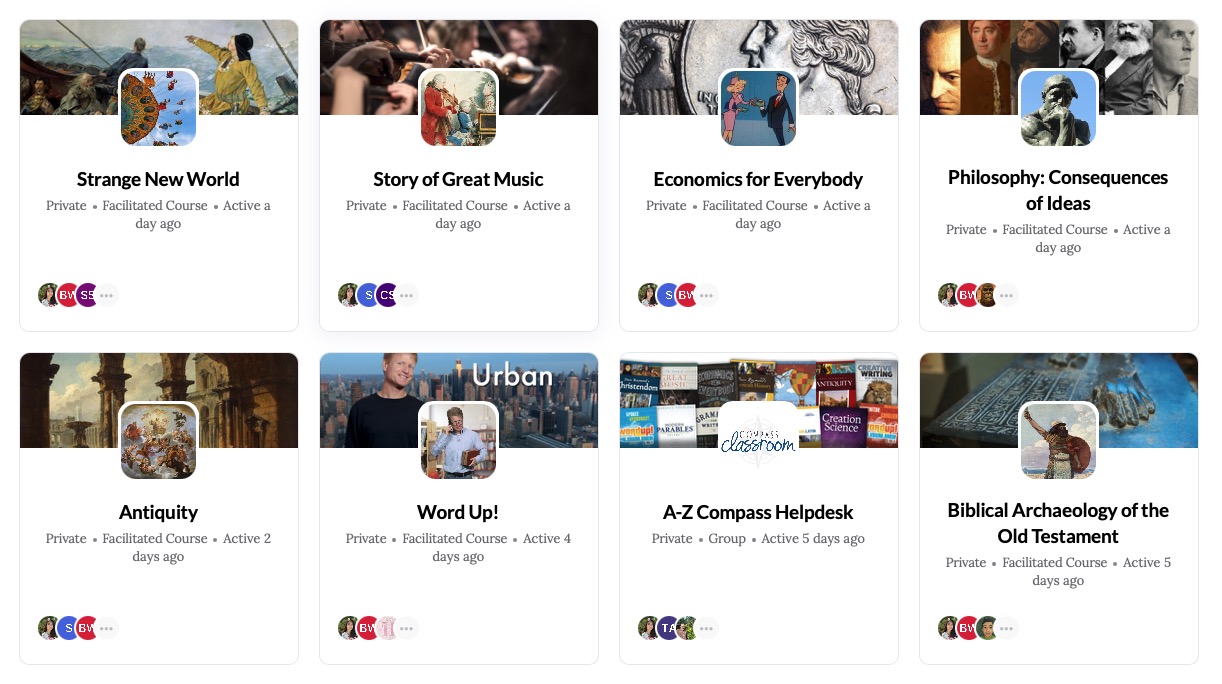
Share this post with another homeschool mom!
When it comes to homeschooling, one of the biggest questions parents often have is, “Can I really do this?” The idea of educating your child at home can feel intimidating, especially when you consider that professional teachers spend years training for their roles. However, as veteran homeschool moms Maggie, June, and Christina discuss, parents are uniquely equipped to educate their children. With the right tools, a supportive community, and a focus on the child’s heart and individual needs, homeschooling is not only possible—it can be one of the most rewarding journeys for both parent and child.
This is just part of a longer conversation between these homeschooling moms. You can read all the interview articles on our blog, or view the video interviews in our How I Homeschool course, available for free on My Compass Classroom.
-
 How I Homeschool$0.00
How I Homeschool$0.00
Yes, You Can Educate Your Child
You Know Your Child Best
Maggie encourages parents by reminding them of a simple yet profound truth: “You know your child.” This knowledge—of their strengths, struggles, interests, and unique personality—makes parents especially suited to guide their child’s education. Homeschooling isn’t just about following a curriculum; it’s about nurturing a whole person, addressing their emotional, spiritual, and intellectual needs. Parents know better than anyone else how to do that.
Maggie believes that homeschooling is about seeing each child as a unique individual, not just as a student who needs to meet certain academic benchmarks. “I’m aiming for the heart of my child,” she says, explaining that education should nurture who they are as individuals, rather than merely preparing them for the next stage or skill.

You Don’t Have to Do It Alone
For those worried about feeling isolated, Maggie reassures parents that today’s homeschooling landscape is rich with resources and communities. “There are so many homeschooling communities now,” she says. These communities offer both practical support—like curriculum advice and tutoring options—and emotional encouragement. Homeschooling isn’t a solitary path; it’s a journey where parents can connect with others who are on a similar path, sharing wisdom and offering help when needed.
Homeschooling is About More Than Academics
A Holistic Approach to Education
One of the biggest misconceptions about education is that it’s solely about academics. For many homeschool parents, education encompasses much more—it’s about character development, moral guidance, and helping children grow into compassionate, confident individuals. “We’re looking at them as a whole person,” Maggie emphasizes. Instead of focusing only on grades and milestones, homeschooling allows parents to nurture every aspect of their child’s growth.
June adds that homeschooling offers a unique opportunity to create an environment where learning flows naturally. This doesn’t mean ignoring academics, but rather viewing them as part of a larger picture. “You’re helping your child develop a sense of purpose, values, and responsibility,” she says. In this way, education becomes more than a series of tests or assignments; it’s about guiding children to become thoughtful, well-rounded people.
Individualized Learning Tailored to Each Child
One of the greatest advantages of homeschooling is the ability to tailor education to each child’s specific needs. Every child learns differently—some excel with hands-on activities, others through reading or visual aids. In a traditional school, it can be challenging for teachers to meet each child’s unique learning style due to large class sizes and curriculum constraints. However, at home, parents can adapt lessons to fit their child’s strengths and interests, allowing them to learn in ways that resonate with them.

Christina points out that individualized learning allows children to develop confidence in their abilities. “Homeschooling lets children progress at their own pace,” she says, which prevents them from feeling rushed or pressured. This personalized approach helps children thrive, as they can spend more time on challenging subjects and move ahead quickly in areas where they excel. For Christina, this flexibility is one of the greatest gifts of homeschooling.
The Importance of Community and Support
Leaning on Other Homeschool Families
For parents new to homeschooling, joining a supportive community can make all the difference. Homeschool groups provide social interaction for both parents and children, as well as practical resources like shared classes, co-ops, and field trips. “The idea that you’re on your own is just not the typical case anymore,” Maggie explains. Today’s homeschooling communities are vibrant and accessible, allowing families to connect and collaborate.
June mentions that these communities often become a second family, where parents can find encouragement and kids can form lasting friendships. “We’re able to share resources, ideas, and our experiences with one another,” she says. In these groups, homeschooling parents can exchange curriculum tips, discuss challenges, and offer each other emotional support, making the journey feel far less isolated.
Accessing Specialized Help When Needed

For parents concerned about teaching advanced subjects like math or science, there are many ways to bring in outside expertise. Maggie notes that homeschooling doesn’t mean parents have to master every subject. Many homeschool families use tutors, online classes, and even community college courses for subjects that require specialized knowledge. This flexibility allows parents to focus on areas where they feel confident, while ensuring their children receive quality instruction in other subjects.
Additionally, Maggie suggests that homeschooling parents shouldn’t hesitate to reach out for help when they encounter a challenge. “You’re not expected to know everything,” she says. By tapping into local resources and educational programs, homeschooling parents can provide a well-rounded education without needing to be experts in every area.
Equipping Yourself with the Right Tools
Choosing a Curriculum That Aligns with Your Family’s Values
Selecting a curriculum is often one of the first steps in homeschooling, and it can feel overwhelming. There are countless options available, each with its own philosophy and approach. Maggie recommends starting with a curriculum that aligns with your family’s educational values and goals. “It’s okay to explore different curricula and find what fits,” she says, encouraging parents not to feel locked into one program if it doesn’t work.
Christina adds that many families blend different curricula to create a unique, personalized program. By choosing resources that reflect their values and approach to education, parents can create a learning environment that feels cohesive and meaningful. This flexibility allows homeschooling to adapt to each child’s needs, whether they’re interested in hands-on science projects, classical literature, or foreign languages.
Developing Your Teaching Skills Alongside Your Child
Another important tool in homeschooling is a parent’s willingness to grow as an educator. While professional teachers undergo formal training, homeschool parents can learn through experience, adapting their methods based on their children’s responses. June points out that homeschooling offers a unique learning curve. “You’ll learn so much as you go along,” she says, reminding parents that they don’t need to start with all the answers.
Parents can also find numerous resources designed specifically for homeschool educators, including books, podcasts, and online courses. These resources can provide guidance on lesson planning, teaching strategies, and child development, helping parents build confidence in their role as teachers. Homeschooling, as June emphasizes, is a journey of learning for both the child and the parent.
Homeschooling as a Journey of Growth
Celebrating Small Successes and Adjusting Along the Way
One of the most rewarding aspects of homeschooling is the opportunity to witness your child’s growth firsthand. For many parents, homeschooling becomes a journey of small successes and daily discoveries. Maggie advises parents to celebrate these moments, no matter how small they seem. “Those little victories add up,” she says, explaining that homeschooling is about the long-term journey rather than immediate results.
Christina reminds parents that flexibility is key. Homeschooling doesn’t need to follow a strict schedule or set milestones. If something isn’t working, parents can try a new approach or switch curricula without feeling guilty. This adaptability allows homeschooling to evolve as children grow, ensuring that the educational experience remains relevant and engaging.
Building Strong Family Bonds Through Learning Together
One of the unexpected gifts of homeschooling is the strengthened family bonds that come from spending time together each day. As parents teach, learn, and explore alongside their children, they develop deep connections that extend beyond academics. “You’re creating a home life that values learning and family time,” June says, highlighting the unique relationship that homeschooling fosters.

These close-knit family dynamics create a supportive foundation for children, giving them the confidence to pursue their passions and tackle challenges. For homeschooling families, education becomes a shared adventure, with parents and children learning from one another in a nurturing environment.
Conclusion: Anyone Can Educate Their Child with Love, Dedication, and Support
The question of whether anyone can educate their child at home often stems from a place of doubt or fear. However, as Maggie, June, and Christina share, homeschooling is more about dedication, willingness to learn, and love for your child than it is about formal training. Parents are uniquely equipped to guide their children’s education because they know their children best, and they have the flexibility to adapt to each child’s needs.
With supportive communities, the right tools, and a focus on the whole child, homeschooling becomes not only achievable but deeply fulfilling. Anyone can educate their child with patience, a commitment to growth, and a focus on fostering a love of learning. Homeschooling is a journey that strengthens families, builds character, and offers an education that is as unique as each child. For those who feel called to this path, homeschooling is an adventure worth embracing, one day at a time.
Share this post with another homeschool mom!









